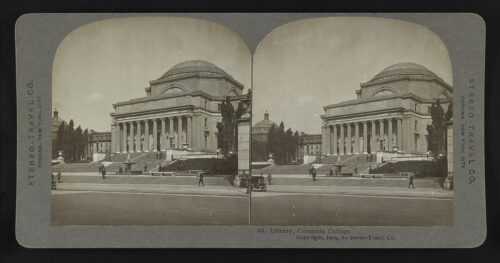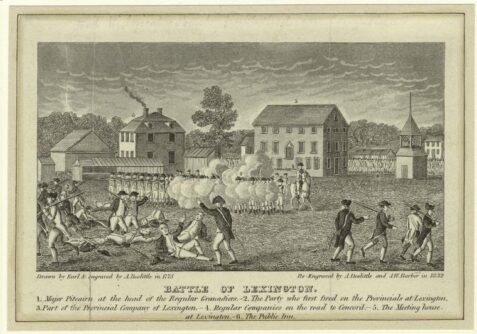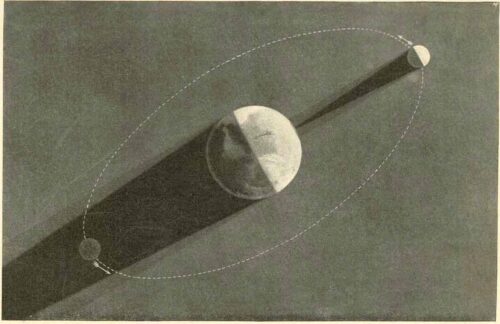A Happy Handful of Black-and-White Examples of the Ways and Means of Loving Thy Neighbor.
As well they should be—given that our nation is distinguished by its charitable practices—American movies are replete with displays of friends in need aided by friends indeed. While the most well-known of Golden Age cinematic kindnesses are found (twice!) in It’s a Wonderful Life—when newlyweds George and Mary Bailey offer up their honeymoon bankroll to backstop their bank-run-frightened neighbors, and later, at the film’s conclusion, when the good people of Bedford Falls rush to donate coins and bills (Mr. Martini: “I busta the jukebox!”) to bail out the troubled George, “the richest man in town”—there are other examples of silver-screen Good Samaritanism that are fitting to be called out during 2023’s season of giving.
Herewith, a subjective-yet-wondrous quintet of such.
Commencing these memorable examples of intimate cinematic charity: the powerful one displayed in I Remember Mama, the 1948 hit directed by George Stevens and starring Irene Dunne as “Mama.” Based on Kathryn Forbes’ 1943 bestseller, Mama’s Bank Account—a collection of vignettes inspired by Forbes’ extended Norwegian-émigré family that settled and struggled in San Francisco at the turn of the 20th century—one of the movie’s most colorful and enduring characters is “Uncle Chris,” the crusty male titan of Mama’s clan, portrayed by Oscar Homolka, who was rightly nominated for an Academy Award for his acclaimed performance.
Uncle Chris lives far enough away from his Bay Area relations that his periodic appearances—heightened by innate, crotchety dramatics that were intended to intimidate (if not frighten) his kin—make him especially memorable. Most memorable are his final moments in the film (and life!), where we find the long-journeyed, extended family at the stricken Uncle’s California farm (“All this expense to watch a wicked old man die of the DTs,” growls sister Jenny), gathered to keep watch over the dying man, and more so to wonder, baldly and aloud, about his estate, assumed to be substantial and destined for his four nieces.
Hope springs infernal: There is no krone to bequest. Leaving the deathbed of her departed uncle (which bid good-bye after a last swig of booze) along with his (surprising!) common-law wife to join her sisters on the porch, Mama—no mercenary, and Uncle Chris’s favorite—delivers the news to her sisters that, along with his money, he is gone.
Jenny: “Did he say anything about the will?”
Without meanness, Mama (her name is “Marta”) speaks truth to avarice, as Irene Dunne’s powerful performance (she too was Oscar-nominated) proves a bracing sermon on charitable giving: “There’s no will,” Marta tells her sisters. “There’s no money either.” As she takes out a small book that accounts for where and how Uncle Chris’s savings had been spent over the years, Jenny couldn’t resist the dig: “Bills from a saloon.”
Nope, explains Mama—with measured dignity about the gruff, small-scale, unbeknownst philanthropist now dead in his bedroom—reading from the departed’s little accounts book:
“You know how Uncle Chris was lame . . . how he walked always with limp. It was his one thought . . . lame people. He would have liked to be doctor and help them. Instead, he help them other ways. I read you the last page. . . . ‘Joseph Spinelli. Four year old. Tubercular left leg. Three hundred thirty-seven dollars, eighteen cents. Walks now.’
‘Esta Jensen. Nine year. Club-foot. Two hundred seventeen dollar, fifty cents. Walks now.’”
Marta continues: “Arne Solfeldt." Heads turn: Arne, her nephew, sits nearby on a tractor. His mom, sister Sigrid, is startled: “My Arne?”
Mama keeps on: "‘Nine year. Fractured kneecap. Four hundred forty-two dollars, sixteen cents.’ It does not tell the end about Arne. I like to write ‘Walks now.’ Yes? Maybe even . . . ‘runs’?”
More names, more cures, are catalogued: Many young people had found healing courtesy of the dollars and cents of this gruff immigrant, this dead-broke farmer whose dying words describe helping those who suffer: “It’s greatest thing in world . . . it is to have a little of God in you.”
Even the once-grubbing aunts, dispelled of fancies of an estate slice, cannot help but agree about what Uncle Chris had done: “It was good.”
And it was.
Another charity-laced Hollywood classic of a Norwegian-immigrant family working hard to make good, albeit in the promised land of Wisconsin, is the 1945 drama Our Vines Have Tender Grapes. With Edward G. Robinson and Agnes Moorehead as the Jacobsons, parents of only child Margaret O’Brien (“Selma,” also called jenta mi—Norwegian for “girl mine”—by her dad), the movie is a by-season story of a hard-working community struggling to achieve success on these foreign shores, and a coming-of-age account of young Selma, often captured through various adventures had with her cousin Arne (played by another popular 1940s child actor, Jackie “Butch” Jenkins).
Our Vines Have Tender Grapes is a charming film, with a troubling-but-wonderful ending. In the farmer community, the common dream and aspiration was to save enough to build a new and undilapidated barn—a structural sign of prosperity, practical too as a means for expansion.
Born Bjornson had attained that dream—but didn’t insure it. And when a lightning bolt hits his new barn, its loft stuffed with flammable hay, the dream turns into a nightmare . . . and a fiery death trap for his trapped herd of cattle. All is lost.
Or is it?
At church an ensuing Sunday, does the community feign rallying on behalf of their tragic neighbor? At first, not so heartily. The plea to Bjorn’s neighbors—“Everything’s been taken from him. He needs our help.”—is followed by the passed basket . . . and the sound of clinking. “Everybody’s dropping coins . . . Look, nothing,” says Selma’s mother.
The collection cries stinginess, and the inklings of shame. Pained by the paucity of aid, Selma asks to speak. The little girl is granted permission.
“If we don’t have any money to give, can we give something else?” Told yes, she replies, “Then I give my nine-month-old heifer calf. She’s purebred Jersey . . . I’ve got papers.”
The congregation is astonished, and Selma’s dad, moved, affirms her generosity: “It’s her calf to do with as she wishes. She says she gives it, then she gives it.” A child shall lead us: The embarrassed, coin-dropping adults stir to offer greater bounty. One man follows Selma’s commitment: “I give two pigs.” The next: “A Holstein cow.” Then: “Two ton of prime clover hay.” Pa: “I give half my silage.” The dam breaks—one after another the farmers commit to much more than their initial crumbs.
The movie, as movies do, parts ways with the novel (by George Victor Martin, and published in 1940) as the service concludes. There is a small and swift penultimate scene as voices are heard outside the church, with people conversing and sounding happy, if not self-satisfied by the outcome—maybe even surprised by the expansiveness of their alms. The book differs:
It was odd the way the people had nothing to say to each other when they all got outside. Usually they stood in front of the church on the grass and passed the time of day in talk of crops and trends and weather. But not this day. As soon as ever they could, they were in their wagons or buggies or cars, and were making their way toward home. It was very odd, too, the way they kept their eyes averted.
Surely because they were embarrassed by their initial meanness, and the need for a child to provide profound correction through an act of genuine charity.
Sometimes though, cinematic agents of mercy can be adults. A display of tender mercies and empathy triggered can be found in John Ford’s 1940 hit, The Grapes of Wrath. Based on John Steinbeck’s colossal bestseller, the movie is strewn with scenes of crushing misery and hunger—and opportunities for kindness and charity—as it tells the tale of the Joads, the dispossessed “Okie” family comically packed with their busted possessions and despair and threadbare hopes into a jalopy that puffs and heaves west through Dust Bowl America to California for alleged work (pickers wanted!) and the chance of daily bread.
Along the way, in a memorable scene, Pa Joad, his two youngest kids in tow, enters a truck-stop diner (“Hamburgers 10¢,” “Hot Cakes & Coffee 20¢”) hoping to buy a loaf of bread so toothless Granny can have something to eat.
“This ain’t a grocery store,” the waitress tells the humble petitioner. But Pa presses his case, his humility apparent, enduring rebuffs (no, he can’t buy sandwiches). From the grill, the cook, who may likely be the proprietor—maybe moved by the desire to be kind, or maybe just wanting the drama to end—has heard enough of the debate: “Give him the bread.” The waitress returns from the storage room with a loaf and a softer heart: a “15-cent loaf” is sold for the thin dime that Pa had budgeted (“We got a thousand miles to go and we don’t know if we’ll make it”). Is it charity? Pa doesn’t want any, and argues for only 10-cents’ worth, but the cook, again providing a hash-slinging Voice of God, renders a judgement: It’s day-old, so the entire loaf is a dime. Pa’s dignity held intact, the deal is struck.
And then the latent kindness escalates. As the kids spy and quietly stare agog at the diner’s candy counter, Pa Joad sees their innocent desire and hopes maybe a meager cent might land them a bit of happiness: Pointing to a big candy stick (“there, them stripey ones”), he asks the waitress, herself now a convert to kindliness, if they’re penny candy. Moved, she explains: “No. Them’s two for a penny.”
Keenly watching the charity play out are two empathetic truck drivers, finishing their meals before heading back to the road. After the Joads leave—the kids each holding a sugary wonderment that gravely counterpoints their family’s bare-boned happenstance—one trucker gruffly lectures the waitress, “Them’s a nickel-a-piece candy,” which earns him a snappy retort: “What’s it to you?”
Plenty. The departing truckers up and leave, paying their tabs with silver dollars. “Wait, you’ve got change coming to you,” says the startled waitress. “What’s it to ya?” is the echoed response of kindness, served with a dollop of sarcasm.
What goes round has come round, as charity, respectful of dignity, begets charity.
Another scene of tender mercy dispensed is found in the exquisite 1945 film A Tree Grows in Brooklyn. Directed by Elia Kazan, and based on Betty Smith’s semi-autobiographical, best-selling novel of the same name, the movie follows the tribulations of the Nolans, whose charming, often-drunk pater familias—played by James Dunn, who won an Oscar for his terrific performance—has trouble bringing the bacon home, where the real boss is Katie Nolan, whose odd-jobbing staves off poverty, and who is now pregnant, a new sibling to join the eldest, Francie, and her younger brother, Neeley.
A loveable dreamer, but emasculated by his limited providing, a sullen Johnny Nolan heads out on Christmas night into a snowstorm—sans coat, with nothing but a meager scarf for protection—to find work. He never returns. A week later he is dead, worn out by the elements and a driven-but-fruitless search for employment.
Into the post-funeral gloom of the widowed Katie comes Mr. McGarrity, owner of the local pub where Johnny preferred to bend an elbow. Has he shown up to the Nolans’ tenement top-floor apartment to pay respects, or maybe to discuss the late customer’s tab?
Played by the popular character actor James Gleason, McGarrity, dressed formally, uncomfortably addresses Katie, telling her, “Johnny would give me some money to keep. . . . Well, I got ta lookin’ around, and what do ya think? I had nearly five bucks in his box. So I figured it belonged ta you.” Katie, kindly, rejects the proffered money: “If you told the truth, it’d be more than likely that he owed you. But thanks very much.”
Thwarted at outright charity, McGarrity won’t leave without dispensing goodness in some form: “Well, there’s something else then. I thought maybe you wouldn’t mind if maybe Francie and Neeley came down and worked for me, afternoons like, after school and Saturdays, and . . . I’d keep an eye on them, and pay them two dollars a week a piece, and I’d take it as a great favor ma’am.”
“You’re a very bad liar Mr. McGarrity, but a very good man,” Katie replies. “And I’m ashamed I didn’t know it before.”
One last example of cinematic charity—here miscast as insanity—is the central story of Mr. Deeds Goes To Town, Frank Capra’s 1936 classic romantic comedy starring Gary Cooper as Longfellow Deeds, a tuba-playing greeting-card author who comes into a fortune when an uncle dies. Set upon by the deceased’s lawyers, who see the New England rural rube as prey for financial manipulation, Deeds is brought to New York City, where he is exploited into becoming front-page tabloid fodder, but remains a man unmoved—and even troubled—by his newfound wealth. He keeps his uncle’s estate lawyers—and their hope to exploit the will—at arm’s length.
Overwhelmed by the hullabaloo, the parade of mooches, the public attention, and the burden of overnight immense wealth, Mr. Deeds starts to run away, back to Mandrake Falls and small-town life. But before he can leave his temporary-home mansion, he is accosted by a bread-line denizen who accuses Deeds of being callous, and worse: “All you ever thought of was pinching pennies, you money-grabbing hick, you never gave a thought to all those starving people standing in the bread lines not knowing where their next meal was coming from, not able to feed their wives and kids . . .”
In the face of widespread Depression misery, the accusation strikes, and prompts a solution: Deeds responds by publicly pledging to give away the fortune to create as many fully equipped, 10-acre farms as $20 million can buy.
There is more of the kind of silly-but-loveable intrigue found in old Hollywood movies—for instance, the lawyers try having Deeds declared insane (“Just because I want to give this money to people who need it they think I’m crazy”)—but the homespun tuba player, a man of common sense and dignity and generosity, prevails.
As does love, of course (with the delightful Jean Arthur). After all, Mr. Deeds Goes to Town is a romantic comedy, and one that proves that silver-screen charity is the province of the pixelated.






